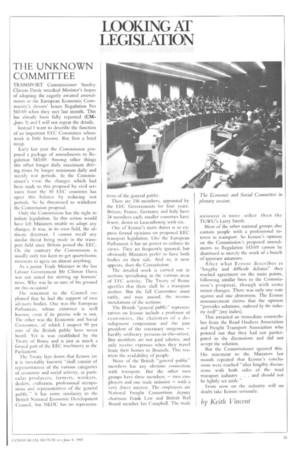THE UNKNOWN COMMITTEE
Page 57

If you've noticed an error in this article please click here to report it so we can fix it.
TRANSPORT Commissioner Stanley Clinton Davis wrecked Minister's hopes of adopting the eagerly awaited amendments to the European Economic Community's drivers' hours Regulation No 543/69 when they met last month. This has already been fully reported (CM,June I) and I will not repeat the details.
Instead I want to describe the function of an important EEC Committee whose work is little known. But first a brief recap.
Early last year the Commission proposed a package of amendments to Regulation 543/69. Among other things this offset longer daily maximum driving times by longer minimum daily and weekly rest periods. In the Commissioner's view the changes which had been made to this proposal by civil servants from the 10 EEC countries has upset this balance by reducing rest periods. So he threatened to withdraw the Commission proposal.
Only the Commission has the right to initiate legislation. So this action would have left Ministers unable to adopt any changes. It was, in its own field, the ultimate deterrent. I cannot recall any similar threat being made in the transport field since Britain joined the EEC. On the contrary the Commission is usually only too keen to get quarrelsome ministers to agree on almost anything.
As a junior Trade Minister in the last Labour Government Mr Clinton Davis was not noted for stirring up hornets' nests. Why was he so sure of his ground oil this occasion?
I lis statement to the Council explained that he had the support of two advisory bodies. One was the European Parliament, whose existence is well known, even if its precise role is not. The other was the Economic and Social Committee, of which I suspect 99 per cent of the British public have never heard. Yet is was established by the Treaty of Rome and is just as much a formal part of the EEC machinery as the Parliament.
The Treaty lays down that Ecosoc (as it is inevitably known) "shall consist of representatives of the various categories of economic and social activity, in particular producers, farmers, workers, dealers, craftsmen, professional occupations and representatives of the general public." It has some similarity to the British National Economic Development Council, hut NEDC has no representa
tives of the general public.
There are 156 members, appointed by the EEC Governments for four years. Britain, France, Germany and Italy have 24 members each; smaller countries have fewer, down to Luxembourg with six.
One of Ecosoc's main duties is to express formal opinions on proposed EEC transport legislation. Like the European Parliament it has no power to enforce its views. They arc frequently ignored, but obviously Ministers prefer to have both bodies on their side. And so, it now appears, does the Commission.
The detailed work is carried out in sections specialising in the various areas of EEC activity. The Treaty of Rome specifies that there shall be a transport section. But the full Committee must ratify, and may amend, the recommendations of the sections.
The British "general public" representatives on Ecosoc include a professor of economics, the chairman of a development corporation and the past president of the veterinary surgeons — hardly ordinary persons-in-the-street. But members are not paid salaries, and only receive expenses when they travel from their homes to Brussels. This restricts the availability of people.
None of the British "general public" members has any obvious connection with transport. But the other two groups have three members — two employers and one trade unionist — with a very direct interest. The employers are National Freight Consortium deputy chairman Frank Law and British Rail Board member Ian Campbell. The trade unionist is none other than the TGWU's Larry Smith.
Most of the other national groups also contain people with a professional interest in transport. So Ecosoc's opinion on the Commission's proposed amendments to Regulation 543/69 cannot be dismissed as merely the work of ;I hunch of ignorant amateurs.
After what Ecosoc describes as "lengthy and difficult debates" they reached agreement on the main points, following similar lines to the Commission's proposal, though with some minor changes. There was only one vote against and one abstention. The Ecosoc announcement claims that the opinion "provides solutions, endorsed by the industry itself' (my italics).
This attracted an immediate counterblast from the Road I Iauliers Association and Freight Transport Association who pointed out that they had not participated in the discussions and did not accept the solution.
But the Commissioner ignored this. His statement to the Ministers last month repeated that Ecosoc's conclusions were reached "after lengthy discussions with both sides of the road transport industry . . . and should not be lightly set aside."
From now on the industry will no doubt take Ecosoc seriously.
by Keith Vincent




































































































